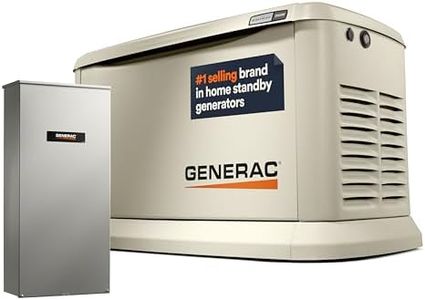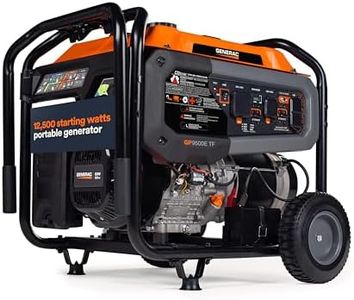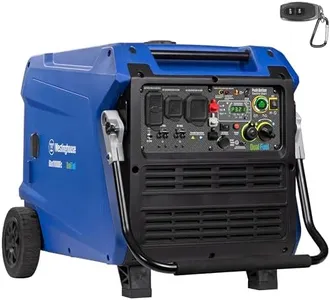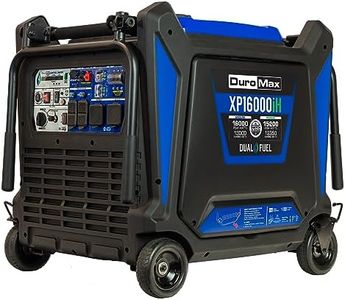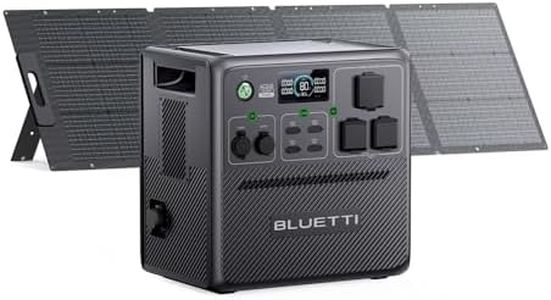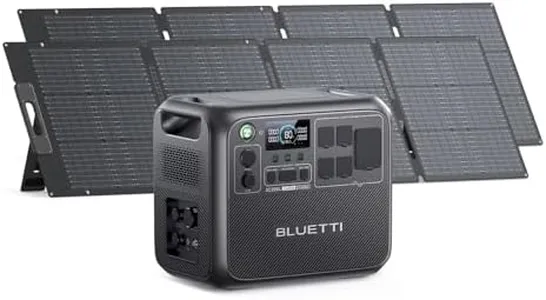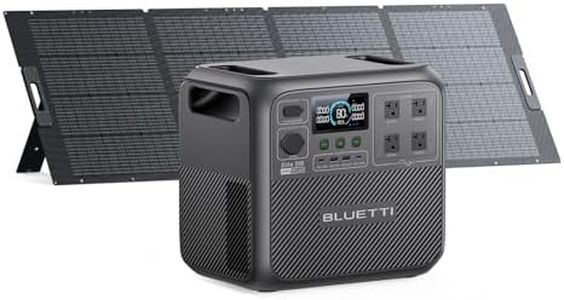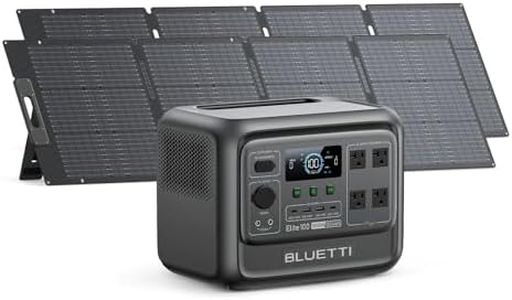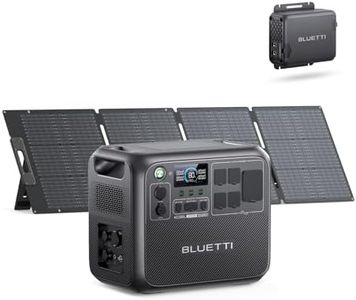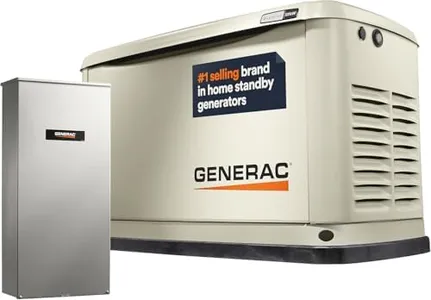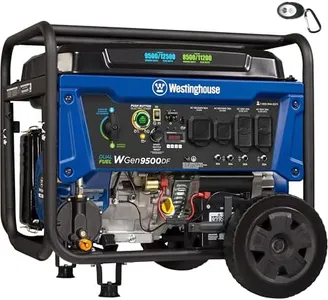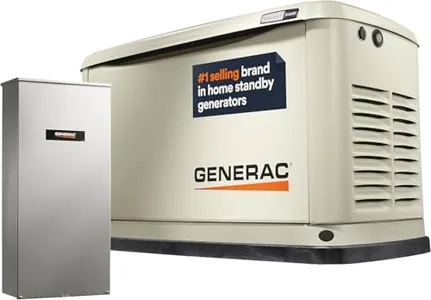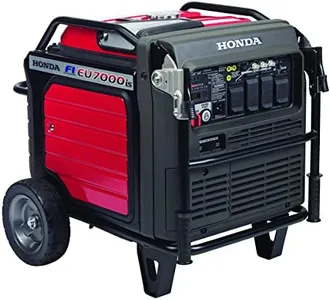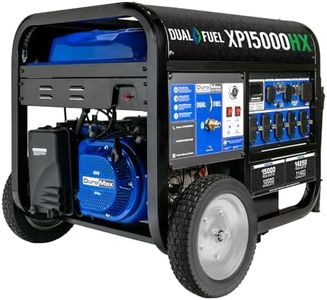10 Best Home Generators 2025 in the United States
Our technology thoroughly searches through the online shopping world, reviewing hundreds of sites. We then process and analyze this information, updating in real-time to bring you the latest top-rated products. This way, you always get the best and most current options available.

Our Top Picks
Winner
Generac Guardian 26kW Home Standby Generator with 200 Amp Transfer Switch - Automatic Whole House Backup Power for Storms, Emergencies, and Outages, WiFi Enabled, Runs on Natural Gas or Liquid Propane
Most important from
418 reviews
The Generac Guardian 26kW Home Standby Generator is a solid choice for homeowners looking for reliable whole-house backup power. Its 26,000-watt output is strong enough to keep most household appliances and systems running smoothly during an outage. It runs on natural gas or propane, which are common and convenient fuel options for home standby generators. The generator features an automatic electronic start, meaning it turns on by itself when power goes out, so you don't have to worry about manual operation.
One of the standout features is its Wi-Fi connectivity, allowing you to monitor the generator remotely and receive maintenance alerts, which adds convenience and peace of mind. The unit is built with a durable aluminum casing and includes a 200 Amp transfer switch that integrates the generator seamlessly with your home's electrical system.
The generator is described as super quiet and low maintenance, but it weighs over 500 pounds and is not portable; it's designed to be permanently installed outside your home. Installation should be done by a licensed electrician, which is typical for this type of equipment. This generator is well suited for homeowners wanting dependable and automatic backup power for their entire house, especially if remote monitoring and quieter operation are important to them. Its size, weight, and need for professional installation mean it is not a portable or DIY-friendly option.
Most important from
418 reviews
Generac 12,500 Starting Watt Tri-Fuel Portable Generator - Electric Start - Gas, Propane or Natural Gas - Home Backup, Jobsite, or RV - Quiet Operation - Long Runtime - 49-State Compliant
Most important from
234 reviews
The Generac GP9500E TF is a powerful portable generator designed to deliver up to 12,500 watts of starting power and 9,500 watts running power, making it well-suited for home backup, job sites, and RV use. One of its standout features is the tri-fuel capability, allowing you to run it on gasoline, propane, or natural gas. This versatility can be very convenient if fuel availability is a concern. The generator offers an easy electric start, eliminating the need for manual pulling, which adds to its user-friendly design.
With a 7.5-gallon gasoline tank, it can run up to about 9.5 hours at half load, providing solid runtime for extended use. Its rugged build includes covered outlets, a steel frame, and heavy-duty wheels, making it durable and relatively easier to move despite its weight of 219 pounds. The unit also includes safety features like a CO sensor and low oil shutdown, enhancing safe operation.
The generator’s weight and size may influence portability and storage considerations. This generator provides a reliable, versatile power source with multiple fuel options and strong power output, making it well-suited for emergency home backup or heavy-duty outdoor work.
Most important from
234 reviews
Westinghouse 11000 Peak Watt Dual Fuel Portable Inverter Generator, Remote Electric Start, Transfer Switch Ready, Gas and Propane Powered, Low THD - Safe for Electronics, Parallel Capable, CO Sensor
Most important from
1105 reviews
The Westinghouse 11000 Peak Watt Dual Fuel Portable Inverter Generator is a robust choice for those needing a reliable home generator. With a high power output of 9000 running watts (gasoline) and 8100 running watts (propane), it can handle most home appliances and electronics safely due to its low THD (Total Harmonic Distortion) of less than 3%. The dual fuel capability is a significant advantage, allowing flexibility between gasoline and propane. Its runtime is impressive, offering up to 17 hours on a 9.8-gallon tank, making it suitable for prolonged use during power outages.
The remote electric start feature, alongside push-button and recoil options, adds convenience, ensuring easy operation even in emergencies. The generator includes various safety features like a CO sensor and automatic low oil shutdown, enhancing its safety profile. Equipped with multiple outlets, including transfer switch-ready options, it is versatile for different power needs. However, its weight of 187.4 pounds may pose a challenge for portability despite being labeled as portable.
Minimal assembly is required, and it comes with essential components like an oil bottle, funnel, and propane regulator. This generator is backed by a 3-year limited service warranty and a nationwide customer service network, offering peace of mind. Users who prioritize power output, fuel flexibility, and runtime may find this generator particularly beneficial.
